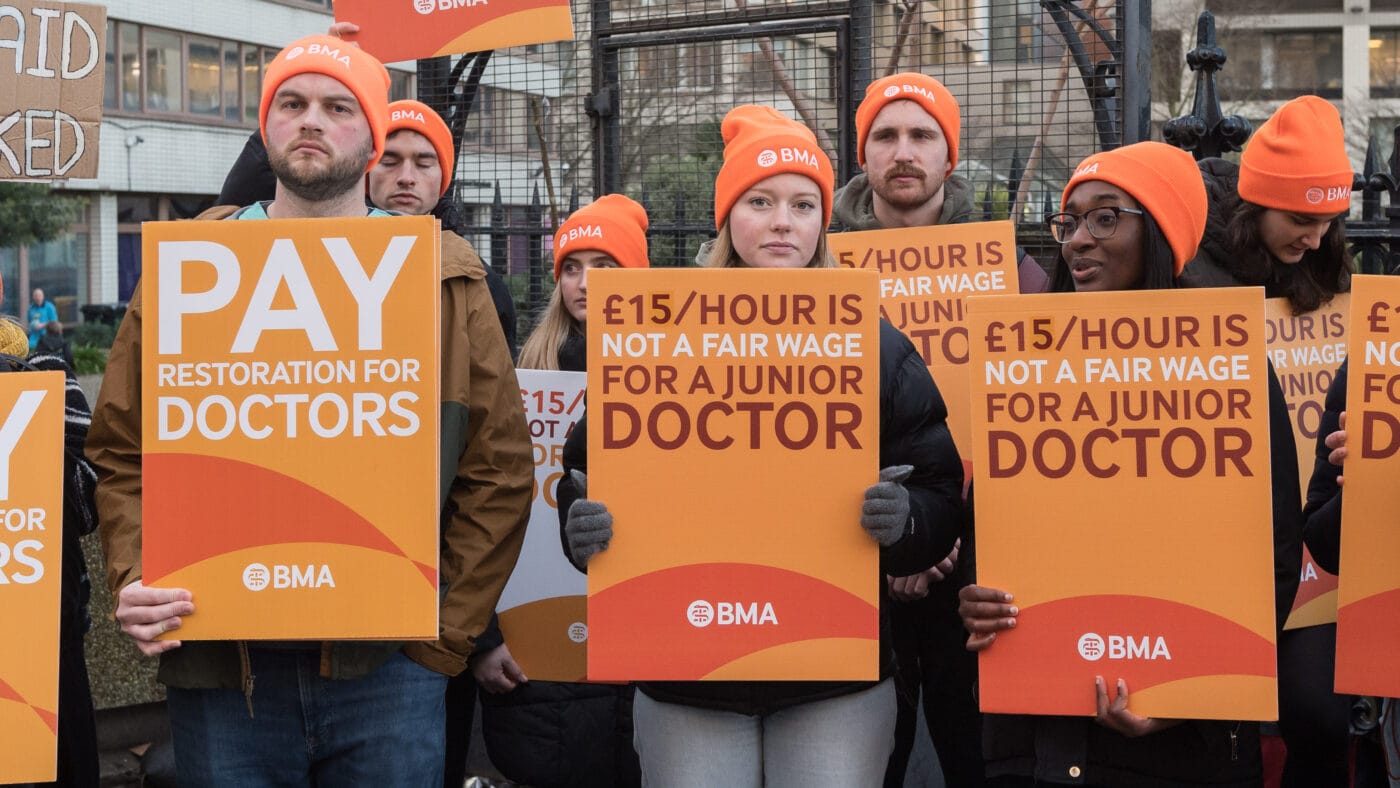Compare for a moment the National Health Service to a theoretical, dysfunctional state-run bistro. It has been poorly managed and undermanaged for years. The kitchen equipment is outdated and frequently fails to work, causing endless delays and frustration for both customers and staff. Successive governments have responded by hiring more waiters and cooks, but this does nothing to address the causes of the dysfunction. The food is often of poor quality, usually takes too long to arrive, and sometimes has negative impacts on customers’ health. These customers continue to patronise the bistro due to almost zero competition. Despite this, the chefs continue to request numerous pay increases.
This is essentially how Britain now approaches NHS pay, particularly for doctors.
Last September, after nearly two years of disputes and 44 days of strike action, junior doctors in England voted to accept a government pay deal worth an average of 22.3% over two years. With a turnout of 69%, with two-thirds backing the deal.
Now the British Medical Association (BMA) is calling for an additional 29% rise. Not phased, not negotiated, but backdated and baked in. The justification for this is that junior doctors are still being ‘underpaid’ relative to 2008/09 levels. This claim may be statistically valid, but it is not unique. Graduate pay over this period has also largely stagnated for private sector workers.
However, what is often left out of this debate is the total value of public sector remuneration, not just salaries, but pensions too.
The NHS Pension Scheme is among the most generous in the OECD. The NHS Pension Scheme, a defined benefit plan that guarantees a pension linked to career-average earnings, indexed to inflation, and backed by the state. Few in the private sector could even dream of the 23.7% employer contribution rate that NHS employees received as of April 2024. Under certain assumptions, for a consultant retiring at 60, the total value of an NHS pension can exceed £2 million. This can translate into retirement packages worth £70,000 to £80,000 a year, guaranteed for life.
Public sector workers, particularly those in the NHS, continue to accrue pension entitlements on terms most private sector employees would find unrecognisable. Unlike in many EU healthcare systems, which are increasingly reliant on private contributions or linked to market performance, NHS pensions are taxpayer-underwritten and inflation-proof. In a post defined-benefit world, this is gold-plated in the extreme.
For some international context, junior doctors in Germany earn similar or slightly higher base salaries but pay more into their pensions through professional pension schemes (or Ärzteversorgung) and work longer hours. In Canada, starting salaries are higher; however, qualified physicians often operate as independent, self-employed contractors, taking on risk and managing their own pensions. In Sweden, doctors are well-paid but the national system has adopted digital triage and centralised appointment booking, allowing for far fewer doctors to see more patients more efficiently.
Yet none of the three above countries are offering NHS-style guaranteed pensions, near job security, and accelerated promotions at taxpayer expense. In Neil Record’s Institute of Economic Affairs paper, ‘The Great British Rake-Off’, the unreported cost of all public sector pensions was £57 billion per year in 2021-22. This figure has most likely risen in recent years. The total liability of unfunded public sector pension schemes is currently valued at a staggering £1.3 trillion.
There is no doubt that NHS staff are under financial pressure. But pressure alone does not justify unsustainable remuneration demands. The UK already spends 11.3% of GDP on health, above the OECD average of 9.2%, and more than countries like Spain, the Netherlands and Australia.
Money is not the primary constraint – misallocation is. The NHS is addicted to throwing labour at structural inefficiencies rather than addressing them. Junior doctors are rightly frustrated by the chaos of their rota, the lack of digital systems, and the antiquated IT they have to work with. But responding with ever-higher salary demands for a system that remains unreformed is a recipe for more of the same.
This is not an argument against paying doctors well. The skills, responsibilities and emotional toll of medical work deserve genuine recognition. However, what is needed is a balanced and objective understanding of total reward, combined with a long-overdue reckoning on how the NHS utilises its resources. Pay demands in isolation, decoupled from productivity or outcomes, risk setting precedents that the system cannot afford.
We often hear about what doctors are owed, but less about what patients are owed. What taxpayers are owed. A healthcare system that is functional and works. One that directs scarce public resources towards delivering care efficiently, rather than focusing on preserving legacy entitlements.
Many doctors want that too. But their interests are not always aligned with the unions that represent them, nor with the bureaucracy that manages them. The BMA’s negotiating posture increasingly resembles that of a trade union in the 1970s, one that is insulated and maximalist.
The danger is not that we lose every junior doctor to Australia, but the entrenchment of high-cost inertia. If wages continue to increase and pensions remain untouchable, the system will never change. A viable alternative may be to offer junior doctors the option to receive reduced state pension contributions in exchange for higher take-home pay. For many, having additional income when looking to buy a home or start a family is likely to be of far better use than the promise of £80,000-a-year package decades down the line, as nice as that may be.
NHS pay structures need modernising, but offering pay rises without reforming services is merely an exercise in political avoidance. Until policymakers understand that NHS sustainability concerns systems as well as salaries, the pressures will continue, and so will the growing frustrations of the public.
Click here to subscribe to our daily briefing – the best pieces from CapX and across the web.
CapX depends on the generosity of its readers. If you value what we do, please consider making a donation.


